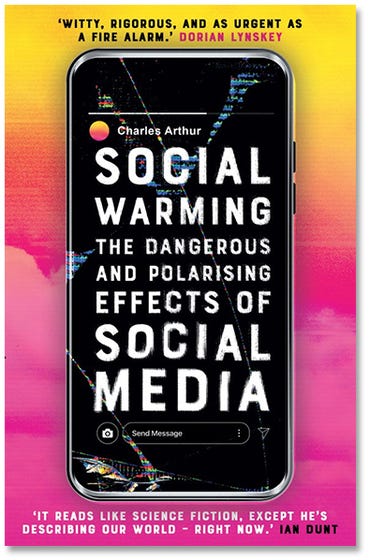
Social Warming: The Dangerous and Polarising Effects of Social Media • By Charles Arthur • Oneworld • 352 pages • ISBN: 978-1-78607-997-8 • £16.99
In 2016, Mark Zuckerberg told an interviewer that “If people were focused on safety first, no one would ever have built a plane.”
The comment was disingenuous: a lot of work went into making planes safer before they began transporting billions of people, and the airline industry has collaborated to improve safety for all in a way the computer industry can only gawk at.
Charles Arthur cites Zuckerberg’s comment in his new book, Social Warming: The Dangerous and Polarising Effects of Social Media, as an example of the attitudes that have driven the development of today’s social media. “No one intended for this to happen,” he writes, but here we are: social media has turned into a force disrupting real lives in seemingly stable societies.
Just as no one who flew to Australia for a vacation meant to help spark wildfires in Greece and California, so no one designed social networks in order to destabilise democracies or provide a home for Russian bots. They just chose not to prevent them.
‘Social warming’, like its climate counterpart, has happened slowly and then suddenly. Anyone who has been online for a while notices the hair-trigger with which ‘flame wars’ can erupt. Today’s moral tribes, however, can ‘break the outrage glass’ over the most trivial things.
SEE: Video meeting overload is real. Here’s how you can to stop the stress building up
Arthur begins by stating these problems, and then reminds us that, circa 2010, cyberutopians believed that social media could turn the world towards democracy. He then dives into how algorithms work and how rapidly disseminated social media interactions foster outrage, following up with examples of how this polarisation has worked in practice in Myanmar, Britain, and elsewhere. Finally, he discusses the rise of misinformation with respect to elections and democracy, and the coronavirus pandemic.
Arthur (obligatory disclosure: he was my editor on three different publications) writes as a British author with a broad international interest. Most of the big technology companies he writes about are American (the rest are Chinese), but the problems they create are global. Business reality means that the attention grabbed by outspokenness is far more profitable than nuanced discussion, and if the result is violence or destabilised governments, the costs do not fall on the social media companies.
What now?
Having thoroughly examined the problems and explained how social media discourse contributes to them, Arthur asks the most important question: what do we do now? Is social warming like the multi-faceted climate crisis, or is it more like the smaller and more fixable hole in the ozone layer?
Arthur quickly dismisses the obvious ‘easy’ solutions — repeal the liability protection conferred by Section 230 or allow the industry to go on regulating itself. Instead, he suggests limiting the size of social networks: a few tens of thousands of moderators clearly cannot handle a network comprising billions of users.
Arthur also suggests tweaking Section 230 to force the social networks to limit algorithmic amplification. We can change these tools to derive the benefits we seek and limit their harms, he concludes. We just need the will to do so.
RECENT AND RELATED CONTENT
Why is your identity trapped inside a social network?
Physics explains why there is no information on social media
NOW the web is 30 years old: When Tim Berners-Lee switched on the first World Wide Web server
New AI tools aim to improve live-stream content moderation
ASPI suggests government work with platforms to fight disinformation for hire
Read more book reviews
Stay connected with us on social media platform for instant update click here to join our Twitter, & Facebook
We are now on Telegram. Click here to join our channel (@TechiUpdate) and stay updated with the latest Technology headlines.
For all the latest Technology News Click Here
For the latest news and updates, follow us on Google News.
